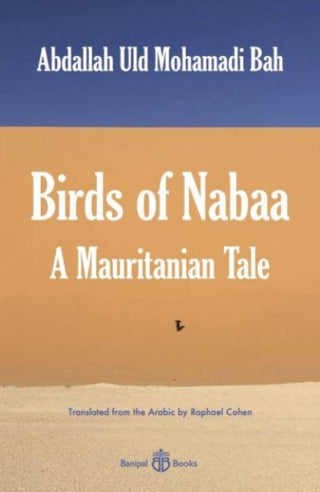-
Birds of Nabaa is a tale of physical and spiritual journeys, from the narrator’s beginnings in Nabaa, a remote Mauritanian village, whose herds lead the community according to their own inscrutable instincts, to life in Madrid, the Gulf states and Guinea, where his work as an embassy accountant takes him, and back to Nabaa and Nouakchott. Inspired by the Sahara of his childhood and devoted from an early age to the vagabond life of the pre-Islamic poets, the narrator’s constant life on the move in search of the inner stillness known only to desert dwellers leads him back always to the music, song and poetry so much a part of Mauritanian life and the spiritual universe of Sufism. The narrator’s travels take him to the village of Kanz al-Asrar near a tributary of the Senegal River, an area so fertile it is like a lush paradise. However, two and more years without any rain create drought, wells dry out, livelihoods shatter, and dreams turn to disturbing and nightmarish premonitions of disaster. The burning fire of the sun is winning its eternal struggle with the hidden water that the clouds plant in the depths of the sand. As desertification takes hold, that paradise of southern Mauritania and of Nabaa gradually declines and the waves of migration, always a feature of life in the Sahara, intensify.
Birds of Nabaa is a tale of physical and spiritual journeys, from the narrator’s beginnings in Nabaa, a remote Mauritanian village, whose herds lead the community according to their own inscrutable instincts, to life in Madrid, the Gulf states and Guinea, where his work as an embassy accountant takes him, and back to Nabaa and Nouakchott. Inspired by the Sahara of his childhood and devoted from an early age to the vagabond life of the pre-Islamic poets, the narrator’s constant life on the move in search of the inner stillness known only to desert dwellers leads him back always to the music, song and poetry so much a part of Mauritanian life and the spiritual universe of Sufism. The narrator’s travels take him to the village of Kanz al-Asrar near a tributary of the Senegal River, an area so fertile it is like a lush paradise. However, two and more years without any rain create drought, wells dry out, livelihoods shatter, and dreams turn to disturbing and nightmarish premonitions of disaster. The burning fire of the sun is winning its eternal struggle with the hidden water that the clouds plant in the depths of the sand. As desertification takes hold, that paradise of southern Mauritania and of Nabaa gradually declines and the waves of migration, always a feature of life in the Sahara, intensify.

